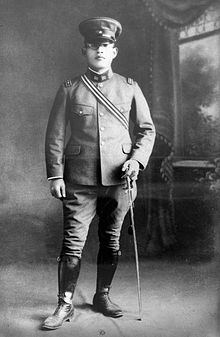Asaichi Isobe
Asaichi Isobe | |
|---|---|
 | |
| Born | 1 April 1905 |
| Died | 19 August 1937 (aged 32) |
| Service/ | Imperial Japanese Army |
| Years of service | 1926–1936 |
| Rank | Lieutenant |
Asaichi Isobe (磯部 浅一, Isobe Asaichi, 1 April 1905 – 19 August 1937) was a Japanese former Imperial Japanese Army officer who was one of the leaders of the February 26th Incident, a coup d'etat attempt by young officers of the Imperial Way Faction.[1]
Career[]
Born in Yamaguchi Prefecture, Isobe graduated from the 38th class of the Imperial Japanese Army Academy[2] and rose to the rank of lieutenant.[1] He was suspended in 1934 for being involved in plans for a coup d'etat, and then discharged from the Army in 1935 when he published an incendiary pamphlet during his suspension.[1] As a civilian, he was a leader in the February 26th Incident and was executed for his involvement.[1][2]
The diary and letters which Isobe wrote in prison were published after World War II. In the letters, Isobe severely criticized Japanese authorities and Emperor Hirohito.[citation needed] The Japanese novelist, Yukio Mishima, extolled the letters of Isobe.[citation needed]
Portrayals[]
Film[]
- Isao Yamagata (『叛乱]』, 1954, Shin Saburi)
- Shinsuke Mikimoto (『重臣と青年将校 陸海軍流血史』, 1958, Michiyoshi Doi)
- Kei Satō (『銃殺 2・26の叛乱』, 1964, Tsuneo Kobayashi)
- Kōji Tsuruta (『日本暗殺秘録』, 1969, Sadao Nakajima )
- Shirō Sano (『悪徳の栄え』, 1988, Akio Jissoji)
- Naoto Takenaka (226, 1989, Hideo Gosha)
Drama[]
- ("[February 26th Incident of [wives]]", 1976)
- ("[Approaching the [New Documentary Drama Showa Seicho Matsumoto incident]]", 1984, Murayama Shinji production)
- ("[love had died in the [Ardor 2.26]]", 1991) (in 'Isomura Asaichi' name)
- Tetsuya Chiba ("[History is moved at that time []]", NHK, 14 day, broadcasting 21 February 2001)
References[]
- ^ Jump up to: a b c d "Isobe Asaichi". Nihon jinmei daijiten+Plus (in Japanese). Kōdansha. Retrieved 10 April 2014.
- ^ Jump up to: a b "Isobe Asaichi". Sekai daihyakka jiten (in Japanese). Hitachi. Retrieved 10 April 2014.
Bibliography[]
- "Isobeasaichi and half life of one innovation officer" (, 1980)
- "February 26th Incident and Isobeasaichi" (Kawade Shobō Shinsha, 1989)
- "February 26th Incident of Yukio Mishima" Bungeishunju November <Bunshun Shinsho>, 2005.
- Masahiko Hamada "army of gods - the darkness of the international financial capital or Yukio Mishima," (, 2000)
External links[]
- Isobe's prison diary (in Japanese)
- 1905 births
- 1937 deaths
- Imperial Japanese Army officers
- Executed Japanese people
- People executed by Japan by firing squad
- Japanese rebels
- Military personnel from Yamaguchi Prefecture